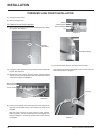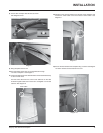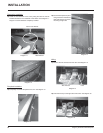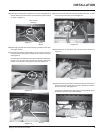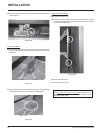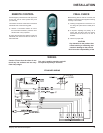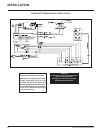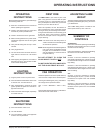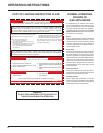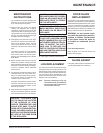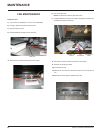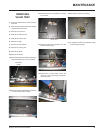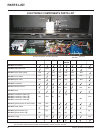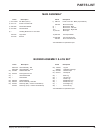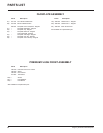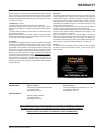Special offers from our partners!

Find Replacement BBQ Parts for 20,308 Models. Repair your BBQ today.

24
Regency IG35 Gas Inbuilt Fireplace
COPY OF LIGHTING INSTRUCTION PLATE
OPERATING INSTRUCTIONS
NORMAL OPERATING
SOUNDS OF
GAS APPLIANCES
It is possible that you will hear some sounds
from your gas appliance. This is perfectly normal
due to the fact that there are various gauges
and types of steel used within your appliance.
Listed below are some examples. All are normal
operating sounds and should not be considered
as defects in your appliance.
Blower:
Regency gas appliances use high tech blowers
to push heated air farther into the room. It is not
unusual for the fan to make a "whirring" sound
when ON. This sound will increase or decrease
in volume depending on the speed setting of
your fan speed control.
Burner Tray:
The burner tray is positioned directly under the
burner tube(s) and logs and is made of a differ-
ent gauge material from the rest of the fi rebox
and body. Therefore, the varying thicknesses of
steel will expand and contract at slightly different
rates which can cause "ticking" and "cracking"
sounds. You should also be aware that as there
are temperature changes within the unit these
sounds will likely re-occur. Again, this is normal
for steel fi reboxes.
Gas Control Valve:
As the gas control valve turns ON and OFF, a
dull clicking sound may be audible, this is normal
operation of a gas regulator or valve.
Unit Body/Firebox:
Different types and thicknesses of steel will
expand and contract at different rates resulting
in some "cracking" and "ticking" sounds will be
heard throughout the cycling process.
WARNING:
DO NOT SPRAY AEROSOLS IN THE VICINITY OF
THIS APPLIANCE WHILE IN OPERATION.
FOR YOUR SAFETY READ BEFORE LIGHTING
A) BEFORE LIGHTING smell all around the appliance area
for gas. Be sure to smell next to the fl oor because some
gas is heavier than air and will settle on the fl oor.
WHAT TO DO IF YOU SMELL GAS
- Do not try to light any appliance
- Do not touch any electric switch, do not use any
phone in your building
- Immediately call your gas supplier from a neighbors
phone. Follow the gas supplier’s instructions.
- If you cannot reach your gas supplier, call the
fi re department.
918-247b
WARNING: If you do not follow these instructions exactly, a fi re or explosion may result
causing property damage, personal injury or loss of life. Improper installation, adjustment,
alteration, service or maintenance can cause injury or property damage. Refer to the
owner’s information manual provided with this appliance. For assistance or additional
information consult a qualifi ed installer, service agency or gas supplier.
B) Do not use this appliance if any part has been under water.
Immediately call a qualifi ed service technician to inspect
the appliance and to replace any part of the control system
and any gas control which has been under water.
This appliance needs fresh air for safe operation and
must be installed so there are provisions for adequate
combustion and ventilation air.
LIGHTING INSTRUCTIONS
TO TURN OFF GAS APPLIANCE
This appliance must be installed in accordance with local codes, if any; if not,
follow the current CAN1-B149/ANSI Z 223.1 (Australia: AS5601-2004, New Zealand: NZS 5261)
DO NOT REMOVE THIS INSTRUCTION PLATE
1) Press the ON/OFF switch once.
2) The LED will fl ash.
CAUTION: Hot while in operation. Do not touch. Severe Burns may result. Due to high
surface temperatures keep children, clothing and furniture, gasoline and other liquids
having fammable vapors away. Keep burner and control compartment clean. See installation
and operating instructions accompanying appliance.
STOP! Read the safety information above on this label.
1) Plug the power cord into a power outlet.
2) Press and release the ON/OFF switch once to start
the unit. The LED will be lit.
3) After approximately 8 seconds the spark ignition
system will spark for 8 seconds to light the main
burner.
4) If the main burner does not light, repeat step 2 to
restart.
3) Turn off all electric power to the unit if service is
to be performed.
You may shut off the pilot during prolonged non use periods to conserve fuel.



